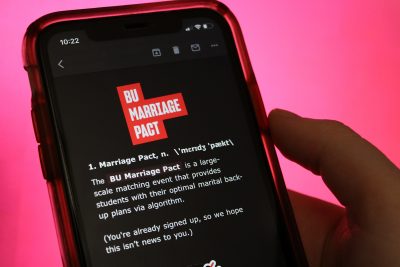
In a time of pandemic-induced loneliness, Boston University students have turned to the Marriage Pact — a matchmaking service that uses math to pair up students looking for love, friendship or anything in between.
The BU Marriage Pact is one of many arms of an initiative started at Stanford University in 2017, which uses a survey of 50 questions — with answers on a scale of one to seven — as well as its own algorithm to match those interested in a long-term relationship.
The BU launch follows an expansion of the Marriage Pact to schools across the country, including Boston College.
College of Arts and Sciences senior Ray Akamatsu said she became a representative for the Marriage Pact at BU when her high school friend, who attends Stanford and was involved in the initial launch, reached out to help spread the project to other schools.
“The original Marriage Pact, they control everything,” Akamatsu said. “They’re the ones who send out the email, they’re the one that sets up the actual survey, so I would say most control goes to Stanford, and we’re just there to help.”
College of Engineering sophomore Jana Ahmed is also a representative and said she believes the Marriage Pact could bring some life back to campus and help initiate interactions that aren’t happening in student’s everyday lives.
“I was thinking, why not just something to rev up spirits a little bit, just give someone a little fun survey to fill out as not quite academic-related,” she said. “Maybe something to foster campus interaction in this especially separated time. Everyone’s pretty, pretty quarantined.”
The survey opened March 14, and students had eight days to complete it before it closed early the following week.
Students, including ENG junior Alvaro Mendoza, received their matches Wednesday. Initially, students are sent only their match’s initials via email, before receiving the match’s full name and contact information in a subsequent email.
Mendoza said he wasn’t expecting a relationship when he filled out the questionnaire.
“I don’t think that there’s any reason why it should work or anything like that, in terms of actually finding a significant match,” he said. “It’s kind of like a Buzzfeed quiz, you see it and you’re like ‘oh, I wonder what kind of fruit I’d be.’”
Survey questions asked about topics such as political beliefs, cleanliness and how many children participants want in the future.
After matching with a student and reaching out to them, Mendoza said he would “be willing to give it a try.”
The survey received 1,076 responses this year, according to an email sent to participants. Akamatsu said the group used word of mouth and social media to gain traction, but had wanted to work with the Student Activities Office.
“It was a bit too late, so they didn’t respond on time,” she said, “but if that would have worked, then maybe we could have had posters pasted around campus.”
With 291 unmatched heterosexual females as of this weekend, according to the platform’s Instagram page, some female participants were matched with people outside of their specified preferences.
Isabella Smit, a senior in the Sargent College of Health and Rehabilitation Sciences, said she was sent a compatible match who happened to be her current best friend.
“We’ve known for a long time that we are friend soulmates, and it was just kind of funny to have an algorithm confirm it for us,” she said. “I made a couple of my guy friends do it, and I don’t think it helped any with the ratio, but exponentially more girls did it than guys.”
With the hope of continuing the project as an annual tradition, Ahmed said the issues will hopefully be ironed out by next year without the difficulties of a global pandemic.
“If we can grow the team at BU, so have more internal ambassadors … help out with the algorithm and marketing every year,” Ahmed said, “we can really make it have a bigger reach across the student body, and I think it’ll be a lot more meaningful as a tradition.”
She added the launch team this year, including herself and Akamatsu, will create a “good foundation” for the following years.
Ahmed said for now, the Marriage Pact will help combat feelings of isolation on campus as students near the end of the school year and could allow participants to simply feel good about having a match.
“I’ve got someone who could be a friend, who could be someone I would actually connect with on campus or someone to hit up after being isolated,” Ahmed said, “especially for international students or off-campus students, people who have been separated from the campus itself.”






















































































































